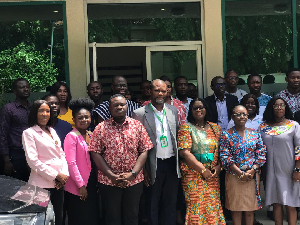The Ministry of Health (MOH), Ghana Health Service (GHS), and other key stakeholders in the health sector convened a stakeholder engagement at the Alisa Hotel in Accra on June 5, 2024, to address the escalating issue of non-communicable diseases (NCDs) in Ghana.
The meeting, which focused on cardiovascular diseases, type 1 diabetes, and sickle cell disease, brought together a diverse group of participants to strategize on effective interventions.
The rising burden of NCDs in low- and middle-income countries (LMICs) poses a significant threat to Universal Health Coverage (UHC). Currently, NCDs account for approximately 70% of global mortality, with 80% of these deaths occurring in LMICs.
In Ghana, 45% of deaths are attributed to NCDs, and an additional 9% to injuries.
Alarmingly, six in ten Ghanaians suffer from hypertension, diabetes, obesity, or a combination of these conditions, highlighting a critical need for improved screening, diagnosis, and treatment.
The PEN-PLUS stakeholder meeting aimed to foster collaboration and drive impactful changes to combat these diseases.
Chaired by Dr. (Mrs.) Martha Gyansa-Lutterodt, former Director and Technical Coordinator of the Ministry of Health, the event included representatives from the GIZ Ghana Heart Initiative, World Health Organization (WHO), Sanofi Ghana, Diabetes Youth Care, Medtronic Labs, ICARE, CDiC, King Health, Clinton Health Access Initiative, Ghana Health Service, and other key organizations.
Juliette Edzeame, Project Manager of the GIZ Ghana Heart Initiative, highlighted the initiative's milestones since its launch in 2019, emphasizing its role in strengthening the management of cardiovascular diseases in Ghana.
"The GHI has achieved many milestones to sustainably strengthen the Ghanaian health system in regard to cardiovascular diseases (CVD) management," she asserted.
Yaa Bimpeh Amoah, a clinic nurse and leader of the Sonia Nabeta Foundation, underscored the foundation's vision of ensuring that children with type 1 diabetes lead long, healthy, and productive lives.
"We believe in a Ghana where children with type 1 diabetes have an equal chance at long, healthy, productive, and gainful lives."
Similarly, a representative from Diabetes Youth Care stressed the importance of bridging the gap between young diabetes patients and medical personnel through education and support.
A key discussion point was the introduction of the DCARD and WHO PEN-PLUS projects. PEN-PLUS is an integrated strategy designed to enhance the quality of services for severe chronic NCDs at primary referral facilities, such as district hospitals.
It focuses on severe NCDs, including type 1 diabetes, rheumatic heart disease, sickle cell disease, and palliative care for advanced malignancies.
The strategy includes training and mentorship for health workers and strengthening health facilities with necessary equipment and supplies.
Dr. Joyce Ansong, NCDs Program Lead at the WHO Ghana Country Office, emphasized the urgent need for action to tackle NCDs, which are crucial for achieving UHC and the Sustainable Development Goals (SDGs) in Africa.
"NCDs have become a significant public health challenge in Africa, requiring urgent, continuous, and substantial action. NCDs are crucial to achieving Universal Health Coverage (UHC) and SDGs in Africa and globally. It's time to act and act now!
WHO PEN, HEARTS, and PEN-Plus are cost-effective solutions and key to achieving SDG target 3.4 and UHC targets. Acting now will not only save millions of lives today but also ensure a healthier region for future generations," she said.
The meeting concluded with a commitment to convene another session to strategize the implementation of the inputs discussed.
Dr. Mavis Sakyi from the Ministry of Health recommended that all suggestions be put into action to optimize resource allocation and effectiveness in addressing NCDs in Ghana.
In her closing remarks, Dr. (Mrs.) Martha Gyansa-Lutterodt acknowledged the challenges in coordination but expressed confidence in the Ministry of Health's ability to re-engineer and reorganize efforts to maintain momentum.
"Coordination is a key issue, and I believe the Ministry of Health will re-engineer and reorganize to ensure that we can keep the momentum and move forward.
"The data research and all the topics we discussed today require the involvement of other strategic stakeholders in the next steps.
"...mental health is total health, and none should be left behind," concluded Dr. Gyansa-Lutterodt.
Click to view details



Health News of Wednesday, 5 June 2024
Source: www.ghanaweb.com

















